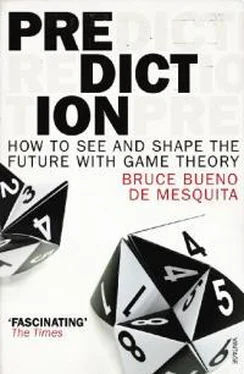The situation was bad enough when you walked in the dealership door, but it only gets worse once a conversation begins. Although you’ve probably done homework online and know something about the invoice price of the car you want, there’s a great deal you don’t know that the dealer does know. When you say you want a gray car, or a blue one, or yellow, you don’t know whether you’ve picked the hottest color in the greatest demand or a color that hardly anyone wants. You may not even know that there can be a price difference of many hundreds of dollars between choosing, say, red or yellow because the dealer treats that choice just the way options are treated—as one more place to pile on costs. You don’t know enough about the local supply and demand to have a good retort when Pat, the salesperson, tells you the vehicle you want is in short supply. Translation: The invoice price on the Internet? Forget it—that’s not going to happen for the car you want. Score another point for the dealer, and still none for you.
As anyone who’s ever bought a new car knows, Pat will almost certainly ask you, “What will it take to put you in this car today?” Now you’re cornered. If you name a really low price, Pat, who has been playing up to you, looks hurt or loses interest, or maybe even becomes just a little rude. Control of the discussion is now fully out of your hands. You feel bad about the lowball offer, you want to establish your good faith, and so you come back with a number close to what you’re actually prepared to pay because you want to keep the conversation going. So Pat has gotten you to put a credible price on the table. Now, after praising the offer, Pat announces that this is a price that can be taken to the sales manager for approval. This is when the price gets jacked up a little bit more to close the deal. Rather than worrying about what the sales manager will say as you sit at Pat’s desk, sipping dishwater-thin coffee from a paper cup, ask yourself, Is it possible that Pat does not know the vehicle’s price?! Hard to believe, since that’s what Pat does all day—sell cars.
You have now given Pat almost all the important information that was in your hands. Meanwhile, you have learned very little about the true state of the market. You may believe that Pat is working on your behalf with the sales manager, telling the manager what a good customer you are and how nice your family is. My guess is that they talk about last night’s football game or how lousy that coffee is, and then Pat emerges with a price.
After some haggling over minor details, hands are shaken and a deal is struck. You feel efficacious. You got a “good” price that you will boast about to your friends. Pat assures you that this is so—and maybe it is, but then the nature of any sale is that the buyer and the seller are both happy with the price; otherwise there’s no deal. You really do not know that you’ve gotten the best price for the car, just as the salesperson does not know that you paid the most you were prepared to pay. But Pat controlled the agenda, revealed little, and worked your price up. That is one more point for the dealer and maybe, just maybe, one for you too. The winner: the dealer by at least 3 or 4 to 1.
Now, the Internet can work much better. There is lots of useful information to be had, including information that car dealers don’t want buyers to know. It’s a great source for finding out a car’s invoice price, for example, and Internet car purchase services generally guarantee that you’ll be contacted by two or three dealers who at least know that you’ve already done some online comparison shopping. Still, making a deal requires going to a dealership. Once you are in the dealership, everything that happens in the first way of buying cars is now going to happen again, except that Pat already knows you’re interested at the price quoted online. Maybe Pat says the exact car you asked about isn’t available. Sure, it could be special-ordered, but that will take a long time. Maybe Pat offers you a seemingly good deal on a different car and the information gained on the Internet fades in importance. How about a similar car with a few extras—maybe a sunroof, a super-duper sound system, special trim, whatever—that you really don’t want? At least that car is on the dealer’s lot, if only for just a little bit more money. Or maybe you close the deal on the car you asked about at the price quoted online. Well, you’re probably closer to the lowest price the dealer will take, but in all likelihood you are not there. After all, they don’t quote a price to you that they expect you to bid up from; they anticipate you’re going to look for ways to cut their price. It must have some give left in it.
So, how else can you buy a car? Here’s what I recommend so that information flows to you and very little information flows the other way; so that beliefs change in your favor and not in favor of the seller; so that prospective sellers are compelled by self-interest to reveal their lowest price (their reservation price, as economists call it) and you are not.
It is always advantageous to control the agenda in a negotiation. In the car-buying context, that means constructing the conversation so that the seller puts her best price on the table knowing that it will not be accepted right now no matter how good it is. To achieve this, the seller needs to be told the game you are playing, including that you’re serious about buying a car. The game goes like this:
Do your homework and decide exactly what car you want to buy. You may go to dealerships for this purpose—I do not, it’s too easy to get sucked in—or you may search online to find the car that best fits your needs. Decide what you value. Is it safety over performance? Style over comfort? Is the color important enough that you’ll pay a premium for one rather than another? Know what options you want and how the options are bundled (sports package, safety package, sound system, etc.). When you know what car you want, including the options, the color, the model, everything, then and only then let your fingers do the walking. Find every dealer that sells the car brand you want within a radius of maybe twenty to fifty miles of your home. For most of us, urban dwellers that we are, that will be a goodly number of dealerships.
Telephone each dealership in the radius you picked. Don’t worry about having to bring the car to a distant dealer for servicing. The manufacturer provides the warranty, not the dealer. Ask to be connected to a salesperson and tell the person precisely what you are doing. Here is my typical spiel: “Hello, my name is Bruce Bueno de Mesquita. I plan to buy the following car [list the exact model and features] today at five P.M. I am calling all of the dealerships within a fifty-mile radius of my home and I am telling each of them what I am telling you. I will come in and buy the car today at five P.M. from the dealer who gives me the lowest price. I need to have the all-in price, including taxes, dealer prep [I ask them not to prep the car and not charge me for it, since dealer prep is little more than giving you a washed car with plastic covers and paper floormats removed, usually for hundreds of dollars], everything, because I will make out the check to your dealership before I come and will not have another check with me.”
If you are making your first call, be sure to tell the salesperson that you will tell the next dealer the price you’ve been quoted. After the first call, make sure the future salespeople know that you will be repeating whatever is the lowest price offered to you so far. That way, future dealers know what price they must beat, and the dealer you are currently talking to knows that if he wants to have a shot at selling you a car, he had better quote his lowest price. Pat’s hands are really tied. Trying to eke out a higher price just means a worse chance of selling you a car. That advantage hardly ever arises when you go to a dealer and give Pat complete control. Instead, you have set up an auction in which everyone knows that they have one chance to make the best bid.
Читать дальше











